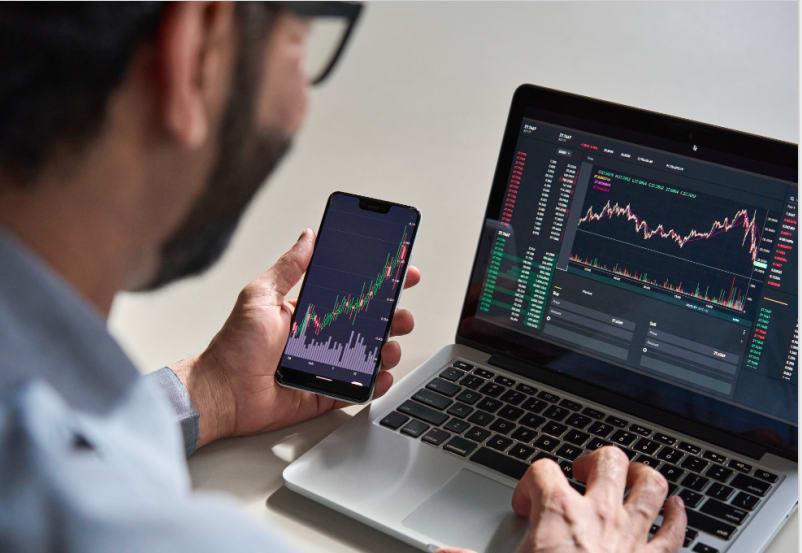What is Cryptocurrency?
Learn what cryptocurrency is, how it works, and how you might use cryptocurrency in the future.
 July 19, 2022
July 19, 2022 12 minute reading
12 minute reading
There are over 19,900 listed cryptocurrencies onCoinMarketCap. Many people struggle to understand cryptocurrency. Maybe someone suggested learning about cryptocurrency, and you're ready to find out more.
We understand your concerns. Many cryptocurrency websites are full of"crypto speak"and are challenging to understand. Still, once you grasp cryptocurrency concepts, you can decode the gobbledygook.
By the end of this guide, you'll learn what cryptocurrency is, how it works, and how you might use cryptocurrency in the future.
Understanding Cryptocurrencies - Cryptocurrency meaning and definition
Cryptocurrency (crypto) is a digital currency stored on a decentralized ledger to enable and record transactions on a computer network. Cryptocurrency does not have regulatory intermediaries and is independent of a centralized authority such as a bank or a governing body.
Cryptocurrency项目效用令牌或走vernance token often used for payments, rewards, purchases, and more. Every project is unique, but the underpinning processes are similar.
What is a blockchain in cryptocurrency?
A blockchain is a network or system, a digital ledger for recording, duplicating, and distributing transactions safely and immutably across the network of computer systems operating on the blockchain. Blockchain developers design the system so encrypted transactions and data are impossible to hack.
For instance, Bitcoin is one blockchain, and Ethereum is another. Everyone has access to and can transact on the blockchains, and developers can build on them.
How does cryptocurrency work?
Cryptocurrency is a digital currency created by encryption algorithms and can be a payment alternative. Take the following steps before using cryptocurrencies for payment:
You need a cryptocurrency wallet:a crypto wallet stores your digital coins in the form of digitally generated encryption keys confirming your identity on the blockchain. Open a "hot wallet", a cloud-based option, or a "cold wallet",a piece of hardware.
Purchase the cryptocurrency:Some cryptocurrency exchanges take credit or debit card payments to purchase cryptocurrency
Transfer the crypto to your wallet:It is risky to leave your cryptocurrency on an open exchange
Once the cryptocurrency is in your wallet, you can transact on cryptocurrency exchanges, and buy, sell, or trade your tokens.
How to create a cryptocurrency
Creating a cryptocurrency involves building a new blockchain, though some develop a new coin by forking an existing blockchain, like creating an offshoot. That requires in-depth knowledge of blockchain technology and basic coding skills. It can be an expensive process, costing up to around $30,000. In addition, the next task is to collaborate with a crypto development company to help design and launch your new token.
You then decide on a consensus mechanism. For instance, Bitcoin is a proof of work (PoW) consensus mechanism, meaning miners work on the blockchain to create and approve blocks. PoW is energy-intensive and expensive to run. Today, Bitcoin miners require vastly superior computer resources for the mining process.
证明股权(PoS) alternativ共识e to PoW and is more popular. Token holders stake their cryptocurrency in the blockchain for a defined period and receive rewards. PoS gives token holders governance, meaning they can vote on decisions on protocols and development. Most PoS cryptocurrency networks are community-led.
The next step is to choose a blockchain platform and design the nodes. After that, you create the foundations for the internal architecture and integrate the APIs. Finally, you develop the interface and make your crypto legal.
Creating a cryptocurrency is a massive undertaking, which is why most founders work with partners to alleviate the pressures of running a blockchain and a community of followers.
Fiverr has many highlyskilled crypto and blockchain expertssuitable for working on your project.
Find Blockchain development services
What is cryptocurrency mining?
It can be challenging to understand the mining process because cryptocurrencies are not tangible items. You've probably heard the term "Bitcoin miners" and wondered how to mine Bitcoin. We mentioned the proof of work (PoW) consensus mechanism in the previous section, and we'll now expand on that using Bitcoin as an example.
Bitcoin miners use top-level computing networks to verify transactions and create new blocks on the system. Bitcoin miners receive Bitcoin rewards if they get closest to solving the "hash problem."
What is a hash problem?
"A hash is a function that meets the encrypted demands needed to solve for a blockchain computation. Hashes are of a fixed length since it makes it nearly impossible to guess the length of the hash if someone was trying to crack the blockchain. The same data will always produce the same hashed value." - Wikipedia
Miners are paid in Bitcoin (BTC). The level of rewards halves every four years. Currently, it's 6.25 BTC per block, and in 2024, it will halve to 3.125. Miners rely on the BTC rewards to cover mining costs and create profits.
Mining is so energy-intensive. The effect on the climate is a subject of heated debate.Bitcoin's annual energy usageis more than Norway's total electricity consumption.
Types of cryptocurrency
There are several different types of cryptocurrency:
Utility tokens- Issued by the blockchain for users to buy products or services on the network.
Payment tokens- A form of cryptocurrency to pay for goods or services internally or externally.
Stablecoins- Stablecoins are "pegged" to the U.S dollar, which means it represents the same value.
NFT tokens- NFTs (non-fungible tokens) are unique tokens that cannot be replicated.
DeFi tokens- The tokens attached to decentralized finance (DeFi) apps.
There are also "meme" coins, a cryptocurrency associated with an internet meme. For instance, Dogecoin (DOGE) started as a joke with a cartoon logo of a Shiba Inu dog. The founders never intended Dogecoin as a serious cryptocurrency, but DOGE rapidly gained thousands of loyal supporters.
What can you do with cryptocurrency?
Yield Farming
Yield farming websites enable you to lend or borrow cryptocurrency and earn interest.
Staking
Stake your crypto tokens with the network for a specified "lock-in" period and earn interest with token rewards.
Low-cost money transfers
Most cryptocurrency blockchains enable fast and low-cost transactions.
Payment for goods and services
Many merchants now accept digital currencies as payment, and numbers will likely increase in the future.
Get paid to post content
For instance,Steemitis a blogging and social media platform paying cryptocurrency to publishers for posting and curating content.
Investing
Investing in cryptocurrency is risky, so takeprofessional financial advicebefore purchasing.
Find financial consulting services
Trading
大多数cryptocurrency交易所提供交易的选择s to their users. However, the cryptocurrency market is notoriously volatile. Therefore, trading crypto is better for experienced traders.
For more suggestions, check out theBrave New Coin article.
What can you buy with cryptocurrency?
Bitcoin is the most commonly used digital currency for purchasing goods and services.
According toCoindesk, a third of small businesses in the United States accept cryptocurrency payments and it suggests that "the list of products and services you can buy with bitcoin continues growing by the day."
Vehicles
You can purchase a Tesla motor vehicle with Bitcoin, andBitcar, an online dealership for luxury vehicles, lists purchase prices in Bitcoin (BTC).
Real Estate
Buying real estate with Bitcoin is now not uncommon. It's usually higher-end real estate property like multi-million dollar penthouses. Three real estate companies that accept Bitcoin payments areBithome,Mercado Libre, andCaliber and Partners.
Art and Collectibles
Some of the world's top auction houses, like Sotheby's and Christie's, now accept cryptocurrency payments. These auction houses also sell NFTs. Notably, in 2021, an NFT (Everydays: the first 5000 days) sold for $69 million. The purchaser used Ethereum (ETH) as payment.
Sporting Events
Many sporting events in the United States accept Bitcoin payments. For instance,BitPay, a cryptocurrency payment processor, partnered with the Dallas Mavericks to enable Bitcoin and cryptocurrency payments.
You can also use Bitcoin (BTC) for purchasing concert tickets and arena events from some organizations.
How to buy cryptocurrency safely?
This section explains how to choose the right platform and purchase cryptocurrency safely.
Register with a cryptocurrency exchange:Choose a reputable platform with a broad range of cryptocurrencies and fiat currencies. In addition, transaction fees can vary considerably, and some offer a crypto-wallet as part of the service.CoinbaseandGeminiare leading cryptocurrency exchanges. Both are beginner-friendly, list multiple fiat currencies, and provide a crypto wallet service.
Verify your account:Upload your KYC documents to access the full range of exchange services.
Deposit:Use your debit or credit card to purchase your chosen cryptocurrency.
Transfer to the crypto wallet:Send the cryptocurrency to your wallet address after purchase.
Why invest in cryptocurrency?
The increase in demand forblockchain developersand cryptocurrency experts is increasing. Companies are hiring to access blockchain technology to improve technical processes. For instance, Microsoft, IBM, Walmart, and other publicly owned companies embrace blockchain technology and digital currencies.
Investors choose cryptocurrencies as a long-term store of value. Most cryptocurrencies have a predetermined, limited supply. For instance, Bitcoin's maximum supply is 21,000,000. That means it has protection from inflation, so centralized organizations like political bodies cannot dilute the value.
Is it safe to invest in cryptocurrency?
Investments cannot be "safe" because the future is unpredictable. The cryptocurrency market is exceptionally volatile. For instance, in 2021, cryptocurrency prices hit all-time highs, but in 2022, prices plummeted. Some financial experts suggest that the cryptocurrency market trails the stock market but has recently detached because of the staggering percentages of lost market capitalization.
You can purchase some cryptocurrency tokens for a minimal price, but that doesn't mean it's a "good" investment, and you could potentially lose all of your money.
The criteria for a safer approach to investing in cryptocurrency is to research the project before investing.
Is the project scalable?If it is not, the price is unlikely to grow in the future.
Does the project have interoperability with blockchains like Ethereum?Interoperability is a factor in the success of a network because it can extend its reach to other blockchains, maximizing its functionality and attracting developers.
Does the cryptocurrency have utility and purpose?一些meme的硬币和一个零效用或目的re riding on the enthusiasm of their followers. For instance, the multiple dog-themed meme coins contribute little to the cryptocurrency industry but are clever marketers that know how to "play to the crowd".
What is the USP?Does the project differentiate from other crypto projects? Is it faster or cheaper? Can developers build on the platform, and is it user-friendly?
Are the founders transparent?Many cryptocurrency projects have anonymous founders. Why is that a red flag for investors? Where is the accountability if founders don't take ownership of their project? Would you buy stock options if you didn't know who owned the company?
Do the founders and team connect with the followers of the project? Open and active engagement with followers encourages the adoption of the cryptocurrency.
The above questions don't guarantee the cryptocurrency you choose will become a profitable investment. Still, conducting these basic checks cut out some of the risks of a cryptocurrency project failing. It increases your knowledge of the project and prevents you from blindly investing because you like the logo or the name of the project.
Why are cryptocurrencies so volatile?
All financial markets are volatile. The Forex market trades $6.6 trillion daily, but it's like a tiny ripple in the ocean compared to cryptocurrency volatility.
The primary reason for the unpredictability is that it's still relatively new. With Forex currencies, we can track historical price action on the charts, going back many years. That helps traders to identify chart patterns and areas of support and resistance. On the cryptocurrency charts, to date, price action is unconfirmed.
Over the last few years, we've observed Bitcoin (BTC) prices rocket 2000% from $3,500 to $20,000 in 2017 and back within a year. That's impossible to assess as probabilities. It's a highly speculative market with lower liquidity and trading volume than other financial markets. Lack of liquidity and high volatility is dangerous for traders and investors.
Another crucial element is market sentiment. After Bitcoin hit the headlines in all international newspapers in 2017, everyone wanted to get involved and make money from Bitcoin and other cryptocurrencies. The danger here is the plethora of uneducated investors buying into the highs and selling their cryptocurrency when prices start to fall. For instance, people bought Bitcoin for $20,000 and then panicked and sold it as the price began declining rapidly. It's a classic novice move. Had they held their nerve, they could have sold their Bitcoin in 2021 for more than three times what they paid in 2017.
As more institutional investors adopt cryptocurrencies, volatility may lessen, and we may see more alignment with more mainstream assets. That situation, though, could be many years before coming to fruition. Meantime, financial advisors suggest that investors don't spend more than they can comfortably afford to lose.
Advantages and Disadvantages of Cryptocurrency
Advantages of using cryptocurrency
Cryptocurrencies can present multiple opportunities for businesses:
Quicker, cost-saving transactions.
The blockchain records ALL cryptocurrency transactions, which means 100% traceability.
The blockchain eliminates the need for intermediaries, which takes away payment processing fees.
Gradually, more merchants are accepting cryptocurrency as payment.
Disadvantages of using cryptocurrency
Using cryptocurrency can create some business disadvantages: -
The risk of losing your crypto wallet. You could also mislay your private key.
You can lose your cryptocurrency forever if you enter the wrong public key in a transaction.
The value of cryptocurrency can shift significantly. If a company holds its treasury in crypto, a massive drop in market prices could wipe it out.
The cryptocurrency market is unregulated. There is no protection, unlike the stock market, which is heavily regulated.
Cryptocurrency exchanges don't have the best reputation (always checkTrust Pilot reviews), and many have had cyberattacks. Most have relevant insurance, but it's still traumatic to find all your Bitcoin suddenly gone.
The cryptocurrency industry is vulnerable to scams. They often use social media to create a frenzy of excitement about their "new project"and disappear with everyone's funds.
Cryptocurrency Terms You Should Know
Altcoin:任何硬币不是比特币。
Bitcoin: The most valuable cryptocurrency.
Bitcoin Cash: A fork of Bitcoin and a peer-to-peer electronic cash system.
Block: A block is a "block" of a predetermined number of transaction records.
Blockchain: An immutable digital ledger created from stacking sequential blocks.
Coin: A store of digital value on a crypto network or blockchain.
Coinbase: A popular user-friendly cryptocurrency exchange and the first crypto exchange listed on NASDAQ.
Cold Storage wallet: A piece of hardware (USB connected) that securely stores your digital assets.
Cryptocurrency: A decentralized, digital currency used as a long-term store of value.
Decentralization: It has no central authority and no intermediaries.
Decentralized Finance: Financial activities that have no alliance with an intermediary, government, or bank, etc.
Decentralized Applications (DApps): Applications designed by developers, built on a blockchain, that have a function without requiring intermediaries.
Digital Cold: Often used to describe Bitcoin.
Ethereum: The #2 listed cryptocurrency by market capitalization. It's the most commonly used network by developers for creating DApps.
Exchange: A cryptocurrency exchange is an online marketplace to buy and sell cryptocurrencies.
Fork: Any changes to a protocol can produce a fork, creating a new blockchain by splitting from the original.
Gas: ETH (Ethereum's crypto token) fees paid to the Ethereum network.
Genesis Block: The first block mined on a blockchain.
HODL: An abbreviation for "hold on for dear life", which means holding on to your cryptocurrency, riding the inevitable waves of volatility.
Halving: Every four years, Bitcoin halves miners' rewards.
Hash: A unique string of letters and numbers that identify "blocks."
Hot Wallet: An online crypto wallet. It's less safe than a cold storage wallet as it is permanently online.
Initial Coin Offering (ICO): Most new crypto projects raise funds by offering an initial coin offering at a predetermined price.
Market Capitalization: Total value of mined coins.CoinMarketCapdisplays these figures.
Mining: The process of creating new coins and maintaining transaction logs.
Node: A computer connecting to a blockchain.
NFTs (non-fungible tokens):Digital art, paintings, music, a text, writing, and anything that can be digitalized.Read more about NFT’s.
Peer-to-peer:Direct interaction between two users without an intermediary.
Public Key:A bit like a bank account number, it identifies your wallet address. Users can send crypto to your wallet when they have your public key.
Private Key:It's like your bank account password. It's to access your wallet, and you don't share it with anyone.
Satoshi Nakomoto:The supposed creator of Bitcoin. Nobody knows if it is a person or a group of people.
Smart Contract:An algorithmic program with predetermined rules for automatic engagement. Ethereum is one of the top networks for executing smart contracts.
Stablecoin:A cryptocurrency (like USDC) pegged to the value of a fiat currency like the U.S dollar.
Token:A cryptocurrency on a blockchain with a specific purpose, such as a governance token.
Vitalik Buterin:The creator of the Ethereum network.
Wallet:Secure storage for your cryptocurrency (see "hot wallet" and "cold wallet").
Cryptocurrency tax issues
Unfortunately, there are tax requirements for cryptocurrency. Every country may have different rules, but the consensus is:
You are liable for capital gains if you sell your cryptocurrency holdings for a profit.
You must pay income tax on interest earned from a crypto savings account (yield farming).
Whether you pay tax depends on your government tax rules and your personal circumstances.
What Does the Future Hold for Cryptocurrency?
As more companies embrace blockchain technology, the future of cryptocurrency becomes more exciting. Worldwide, economies are collapsing, and prices are increasing. Mainstream finance is letting consumers down, and inflation is at its highest.
Venture capitalists are investing in start-up tech companies deploying blockchain technology. It's a fast-growing industry, and institutions are embracing cryptocurrencies to streamline their services more efficiently.
Regardless of the state of the trading market, cryptocurrency experts suggest that we can look forward to a decentralized future. The cryptocurrency industry may well determine the future of business.



